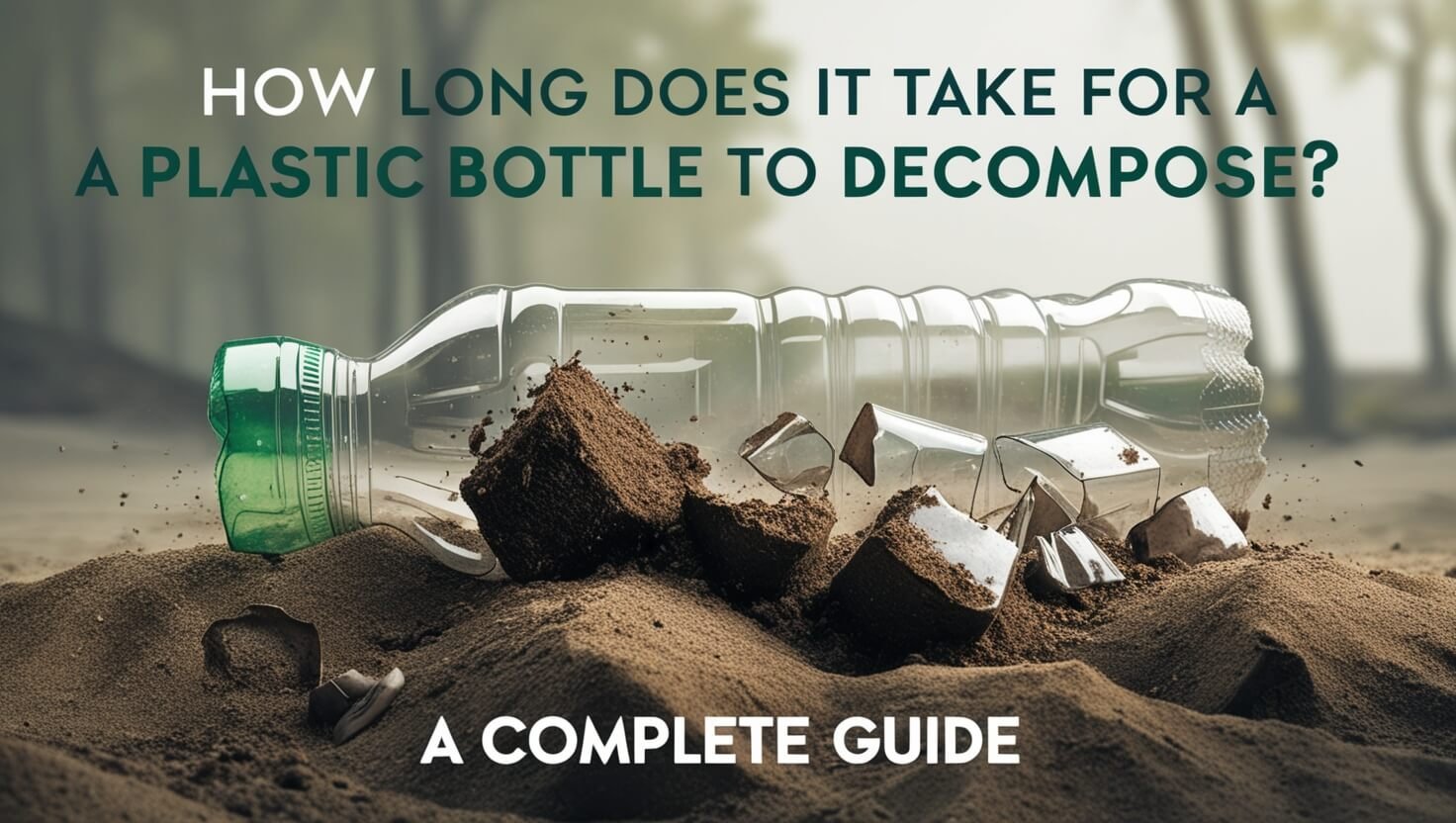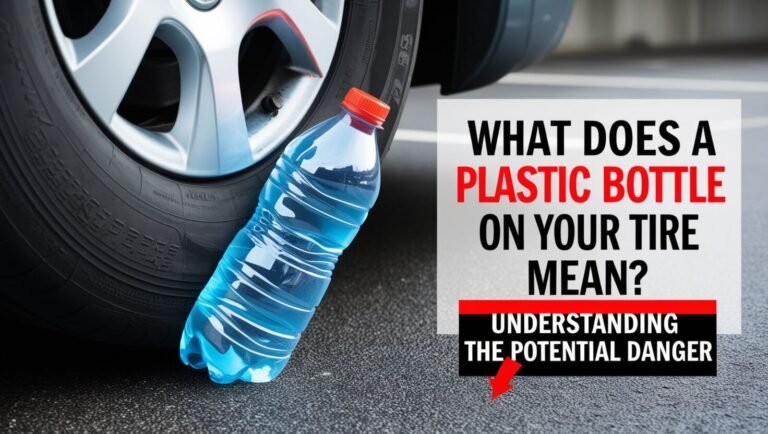How Long Does It Take for a Plastic Bottle to Decompose?

Ever tossed a plastic bottle in the trash and wondered about its fate? You’re not alone. The question of how long it takes for a plastic bottle to decompose is more complex – and alarming – than you might think. Plastic bottles can take a staggering 450 years or more to decompose fully. This means that the plastic bottle you casually discard today could still be around when your great-great-grandchildren are born.
In this comprehensive guide, we’ll dive deep into the world of plastic bottle decomposition. We’ll explore why it takes so long, the environmental impacts, and what we can do to address this pressing issue. Whether you’re an eco-warrior or just curious about the lifecycle of everyday items, this article will provide you with valuable insights into the persistent nature of plastic bottles.
Introduction to Plastic Bottle Decomposition
Plastic bottles have become a ubiquitous part of our daily lives. From water to soda, these convenient containers are everywhere. But their prevalence comes at a significant environmental cost.
The prevalence of plastic bottles
It’s hard to overstate how common plastic bottles are in our modern world. Billions are produced annually, with many used for mere minutes before being discarded. This widespread use has led to a massive accumulation of plastic waste in our environment.
Why plastic bottle decomposition matters
The slow decomposition rate of plastic bottles is a critical environmental issue. As these bottles linger in landfills, oceans, and ecosystems, they pose serious threats to wildlife and contribute to pollution. Understanding how long plastic bottles take to break down is crucial for grasping the long-term impacts of our consumption habits.
Understanding Plastic Bottles
To comprehend why plastic bottles take so long to decompose, we need to look at what they’re made of and how they’re designed.
What are plastic bottles made of?
Most plastic bottles are made from a material called polyethylene terephthalate (PET). This synthetic polymer is chosen for its durability, lightweight nature, and resistance to breakage. While these qualities make PET ideal for packaging, they also contribute to its persistence in the environment.
Types of plastic used in bottle production
While PET is the most common material for beverage bottles, other plastics are also used in bottle production. These include:
- High-density polyethylene (HDPE)
- Low-density polyethylene (LDPE)
- Polypropylene (PP)
Each of these plastics has different properties and decomposition rates, but all are notably slow to break down in natural environments.
The Decomposition Process of Plastic Bottles
To understand why plastic bottles take so long to decompose, we need to look at the process of decomposition itself.
What is decomposition?
Decomposition is the natural process by which organic materials break down into simpler substances. This process is typically carried out by microorganisms like bacteria and fungi. However, plastic bottles pose a unique challenge to this natural cycle.
How plastic bottles break down
Unlike organic materials, plastic bottles don’t biodegrade in the traditional sense. Instead, they undergo a process called photodegradation. This means they slowly break down when exposed to sunlight. Over time, UV rays cause the polymer chains in the plastic to become brittle and fragment into smaller pieces.
Factors affecting plastic bottle decomposition
Several factors influence how quickly a plastic bottle will break down:
- Exposure to sunlight: More sun exposure can speed up photodegradation.
- Temperature: Higher temperatures can accelerate the breakdown process.
- Oxygen availability: Plastic buried in landfills decomposes even more slowly due to lack of oxygen.
- Chemical additives: Some plastics contain additives that can slow down or speed up decomposition.
Timeframe for Plastic Bottle Decomposition
Now, let’s address the central question: how long does it really take for a plastic bottle to decompose?
Estimated decomposition time for plastic bottles
Research suggests that a plastic bottle can take anywhere from 450 to 1000 years to decompose fully. This incredibly long timeframe is due to the stable chemical structure of PET and other plastics used in bottle production. It’s important to note that even after this time, the plastic doesn’t completely disappear – it just breaks down into smaller and smaller pieces.
Comparing plastic bottle decomposition to other materials
To put this in perspective, let’s compare the decomposition time of plastic bottles to other common materials:
- Paper: 2-6 weeks
- Cotton cloth: 1-5 months
- Wool sock: 1-5 years
- Tin can: 50 years
- Aluminum can: 80-200 years
- Glass bottle: 1 million years or more
As we can see, plastic bottles fall on the higher end of this spectrum, taking centuries to break down.
Environmental Impact of Slow Plastic Bottle Decomposition
The extremely slow decomposition rate of plastic bottles has far-reaching consequences for our environment.
Plastic pollution in landfills
Landfills are overflowing with plastic bottles that will remain intact for centuries. This not only takes up valuable space but can also lead to the leaching of harmful chemicals into the soil and groundwater.
Ocean plastic and marine life
Millions of tons of plastic end up in our oceans each year. As plastic bottles slowly break down, they create smaller plastic pieces that can be mistaken for food by marine animals. This can lead to malnutrition, starvation, and death for many species.
Microplastics: A growing concern
As plastic bottles break down, they create tiny particles called microplastics. These microscopic pieces of plastic are now found everywhere – from the deepest ocean trenches to the air we breathe. The long-term effects of microplastic pollution on human and environmental health are still being studied, but early findings are concerning.
Alternatives to Traditional Plastic Bottles
Given the environmental issues associated with plastic bottles, many alternatives are being developed and promoted.
Biodegradable plastics
Some companies are creating bottles from biodegradable plastics. These materials are designed to break down more quickly and completely than traditional plastics. However, it’s important to note that many of these still require specific conditions to decompose effectively.
Reusable bottle options
One of the simplest solutions is to switch to reusable bottles made from materials like stainless steel, glass, or durable BPA-free plastics. These can be used hundreds or thousands of times, significantly reducing waste.
Innovative packaging solutions
Researchers and companies are exploring novel packaging materials, such as edible water bottles made from seaweed extract or containers made from compressed hay. While many of these are still in development, they show promise for a more sustainable future.
Recycling Plastic Bottles
Recycling is often touted as a solution to the plastic bottle problem. While it’s not perfect, it can help reduce the environmental impact of plastic waste.
The importance of recycling
Recycling plastic bottles helps conserve resources, reduce energy consumption, and decrease the amount of plastic ending up in landfills and oceans. It’s a crucial part of managing plastic waste.
Plastic bottle recycling process
The recycling process for plastic bottles typically involves:
- Collection and sorting
- Cleaning and removing labels
- Shredding into small flakes
- Melting and reforming into new products
Challenges in plastic bottle recycling
Despite its benefits, plastic bottle recycling faces several challenges:
- Not all types of plastic are easily recyclable
- Contamination can render batches of plastic unrecyclable
- The recycling process itself requires energy and resources
- There’s often a lack of infrastructure for efficient recycling
Reducing Plastic Bottle Usage
While recycling is important, reducing our use of plastic bottles in the first place is even more effective.
Personal strategies to decrease plastic bottle consumption
Here are some ways individuals can reduce their plastic bottle usage:
- Invest in a reusable water bottle
- Use a water filter at home instead of buying bottled water
- Choose products in glass or aluminum containers when possible
- Bring your own container for takeout drinks
Community and government initiatives
Many communities and governments are taking steps to reduce plastic bottle waste:
- Bans on single-use plastics
- Deposit schemes for bottle returns
- Installation of public water fountains
- Education programs about plastic pollution
The Future of Plastic Bottles
As awareness of plastic pollution grows, so do efforts to address the issue of slow plastic decomposition.
Emerging technologies in plastic decomposition
Scientists are researching various methods to speed up plastic decomposition:
- Enzyme-based solutions that can break down plastics more quickly
- Bacteria and fungi that can digest certain types of plastic
- Chemical processes to recycle plastics more efficiently
Potential policy changes and regulations
Governments worldwide are considering stricter regulations on plastic production and use:
- Extended producer responsibility laws
- Higher taxes on single-use plastics
- Mandatory recycled content in new plastic products
- Improved labeling for proper disposal and recycling
The Bottom Lines: Taking Action on Plastic Bottle Decomposition
The journey of a plastic bottle doesn’t end when we toss it away. In fact, it’s just beginning a centuries-long process of slow decomposition. With plastic bottles taking 450 years or more to break down, the environmental implications are staggering.
However, this doesn’t mean we’re powerless. By understanding the issue, we can take steps to reduce our plastic bottle usage, support recycling efforts, and advocate for more sustainable alternatives. Every plastic bottle we don’t use is one less that will linger in our environment for centuries to come.
As consumers, we have the power to drive change through our choices. By opting for reusable bottles, supporting companies that use sustainable packaging, and properly recycling when we do use plastic, we can make a significant difference.
Remember, the plastic bottle you save today could mean a cleaner beach, a healthier ocean, or a safer environment for wildlife hundreds of years from now. The choice is in our hands – let’s make it count.






